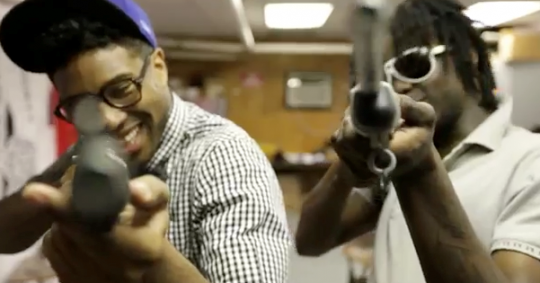Features
A History of Violence: Keef, Drill, and Chiraq (Part 2)

This is the second installment of Kyle Thacker’s essay on the musical history of Chief Keef, his connection to drill music, and gang culture in Chicago. Part one can be read here.
Complex Magazine ran a critique of the documentary The Field. Overall the critique, written by (once again) David Drake, was positive, but it did further the arguments and perspective of the documentary to push the idea that the rise of Chicago drill music artists helped bring much needed attention to the gang-related issues plaguing already impoverished communities of Chicago’s south, west, and east sides. It was the “rapper-as-reporter” idea that has been used to defend rap to outsiders who see the violence in hip-hop as being promoted by the rappers as opposed to criticize, or simple “reported.”
This idea of a positive outcome through the negativity of drill music was the focus of an article in the Chicago Reader from September 2012. The piece pitched Keef as an anti-hero. The Reader article made an impressive point that the violence showcased in the lyrics and videos of drill artists, often times directed at other gang members and artists by saying “This isn’t rap beef. This is gang beef in a rap setting.”
This “anti-hero” argument surfaced after CK’s image took a huge hit in September of 2012. This seems to be the point where the two separate (but related) narratives of music and gang-violence become a single narrative.
It was the murder of Joseph Coleman, or “Lil Jojo”, a rival musician/gang-member of CK and his a crew. Coleman was killed in what was an apparent gang attack. Coleman and CK had been sparring back and forth through music videos and social media. After Coleman’s death, a tweet from CK’s twitter account on September 5th commented on the death. In truly nihilistic and ugly fashion, the tweet mocked Coleman, saying: “Its Sad Cuz Dat Nigga Jojo Wanted To Be Jus Like Us #LMAO”
People were repulsed. The Chicago Police Department took note too, and began investigating CK’s role in the murder. This was no longer just entertainment – the tweet had more impact on CK’s image than any single line from his music. It made people come around to the sentiments expressed by Lupe Fiasco a week prior to the tweet. Lupe, in an interview with a radio station in Baltimore, said that “Chief Keef scared [him].”
The controversy surrounding the tweet was furthered when Pitchfork retracted a video from an interview they did with CK in July. The interview, for Pitchfork’s rap-focused “Selector” series, took place at a gun range. The interview starts off like a lot of Keef’s videos, with guns pointed towards the camera while a rap beat played as the soundtrack. The video was requested by the Chicago Police Department as evidence of CK violating his probation.
There had been over 263 murders in Chicago by the time Pitchfork published this interview in July. On September 4th, Joseph Coleman became the 376th person murdered in 2012.
Now the media played a role in the legal troubles of an artist. The Pitchfork interview highlights a (potential) problem that has been plaguing hip-hop for so long: the people who listen to and cover this music a lot of times don’t look like those who make the music. They don’t come from the same background as these artists and don’t face the same life circumstances.
It was interesting to note that Pitchfork didn’t pull the interview until after the CK-Lil Jojo tweet in September. Very few outlets took offense to the interview being hosted in a gun range. Complex ran a write-up on it, essentially co-signing it as something worth viewing. Seven months into a very deadly year there was little criticism of CK outside of his music.
The rapper Rhymefest was featured in The Field as an elder statesman of Chicago’s rap scene. He currently works to create a better life for Chicago’s poor communities by helping kids through mentoring programs. Rhymefest was also one of the few loud voices to point out the direct relation and influence between artists like CK and the violence these rappers rhyme about in their music. He wrote in April of 2012 that Chief Keef was “a bomb” whose sole purpose was to “destroy.” He also criticized the role of the music industry in building and promoting these “bombs.”
What the coverage of CK showed us is that the media has a very hard time being socially critical of anything presented as entertainment. It’s unfortunate but it seems that the “rapper as reporter” ideal is really just an ideal. We didn’t take anything out of Keef’s music other than a certain value of entertainment. It wasn’t his music that led to the dual coverage of Chicago’s violence and Chicago’s rappers that we have today – it was a tweet. And it was for other rappers, non-rappers were the ones to point out the potential dangerous element of drill music catching fire.
It’s probably why Rhymefest now acts more as a mentor than a musician. Can we expect our musicians to be heroes or anti-heroes when we really view them as entertainers? We can only do that if we become more critical of ourselves and what we deem as entertainment.
Chicago ended 2012 with 514 homicides. 2013 saw a significant drop with 415 murders – Chicago’s lowest since 1965.